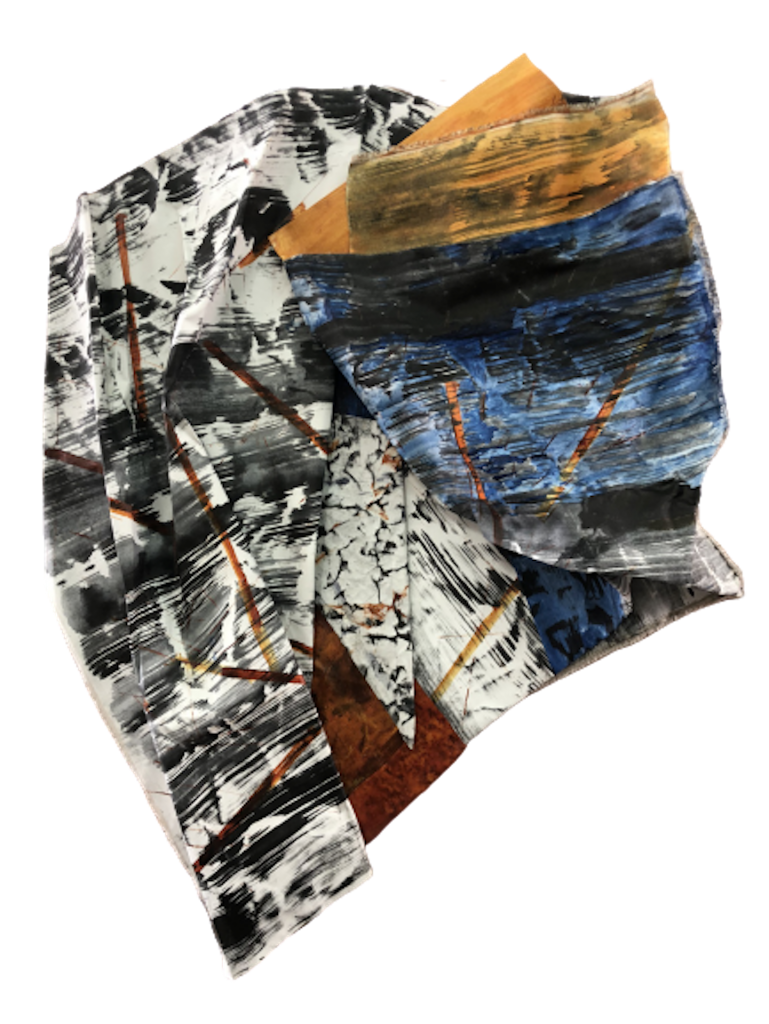
Please Follow us on Gab, Parler, Minds, Telegram, Rumble
Beginning with a personal essay, Shulamit Kopf details her latest exhibition concerning the subject of journeys…
With a family history of inter-generational migration, bouncing back and forth between continents, it is not surprising that my new series explores the subject of journeys.
But just because I wander does not mean I’m lost.
I began my “journey” series two years ago with un-stretched canvasses, two meters long by one meter wide, on which I rendered thin black lines that curve, meander, turn corners, meet together, veer away and at times intersect. Knowing how way leads on to way (in the words of poet Robert Frost) and since lines can fold back in time and space, I began folding the canvases creating new intersections for the lines to meet, worm holes of sort. Over time the folded canvasses began amassing volume turning into wall sculptures breaking the bourgeois concept of traditional canvass stretched on wooden frames.
But with each folding of the canvas there is also loss, parts that must be reluctantly given up and hidden, just like parts one leaves behind when one leaves on a journey, it takes courage to let go.
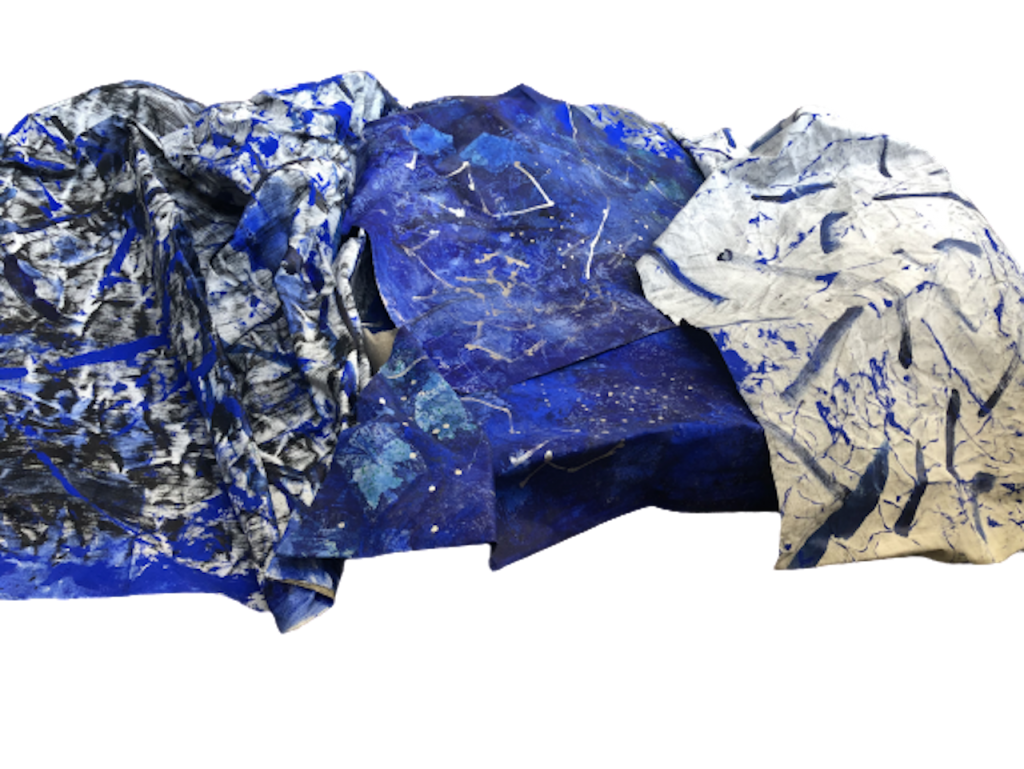
I “stretch” the concept of canvas as far as I can with playful experimentation.
The only painting done on a traditional canvas in this series is a work titled “We Only Have What We Bear and What We Give.” It depicts an old woman, bent over, trudging on a long journey burdened by a heavy load. But even here I break tradition and paint on the backside of the canvas. I collaged the wooden frame with bits of vintage black and white photographs telling humanity’s journey from newly hatched fish eggs to dinosaur bones, a misty rain, an English tea set and skyscrapers.
I like to collage vintage black and white photographs in my work which evoke layers of memory. I began this process while preparing for my last solo exhibition, “Moscow to Berlin,” which opened in Israel and then traveled to Poland and France.
It was all about memory, my mother’s journey as a soldier in the Polish army during World War II. In those works, I embedded photographs of my mother plus historic yellowing bits of 70-year-old letters she wrote to her parents from the front (copies, not the originals). The paintings in cool whites and creams, dark blacks and gloomy greys were all done on traditional stretched canvases.
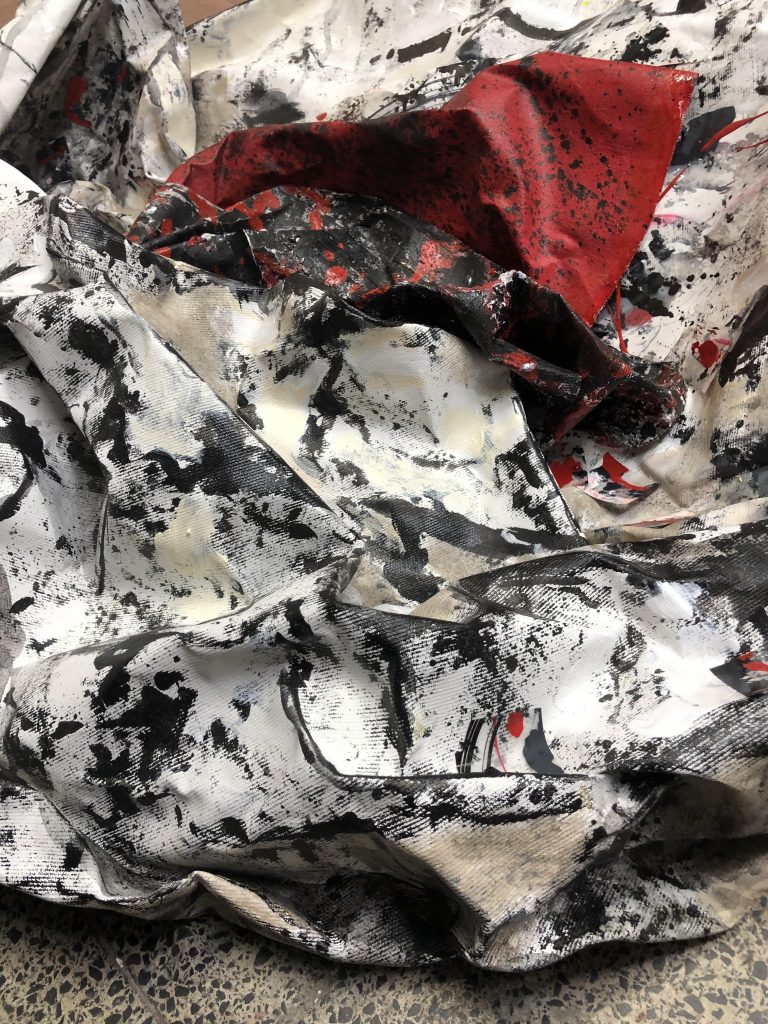
My work changes over time. I have not yet settled on a certain signature style that is immediately recognizable and that is okay with me.
For now, I am much too curious to settle into one mode. I was a professional journalist for many years and the same curiosity drives my art.
In one recent work I took an older, heavily textured abstract stretched canvas and adapted a natural inhibition: I took a knife and slashed it in two places. I then threaded through the two cuts a newly painted un-stretched canvas so that the two works merged into one.
I don’t know if I will ever be able to go back to painting on a canvas sitting prettily on an easel. Like Robert Frost said in his poem, ‘The Road Not Taken,’ about a traveler who must choose between two roads and takes the one less travelled on, he wrote, “I doubted I should ever come back.” He ends with the line, “And that has made all the difference.”
Kopf’s latest exhibition is emblematic of her past…
Shulamit Kopf was born in Israel in 1954 and migrated with her parents to New York City at age ten. It was her parents’ second migration, both originally from Poland. Kopf, a journalist who had worked as a reporter for The Miami Herald and has written for The Washington Post, returned to Israel with her two children. Both children moved to live in the U.S., but one just recently moved to Europe, starting the three continent migration dance all over again.
This restlessness is reflected in Kopf’s work. She likes to experiment and invent new techniques, always asking the question: “I wonder what will happen if…”
“I have a notebook in which I write my “what if…” questions. New ones pop up in my mind all the time, sometimes during the night and I can’t keep up with the list. I have more questions than answers.”
One of her questions is what would happen is she uses her kitchen vegetable grater to grate a fine mist of black charcoal into fresh white paint. Another is what would happen is she dips small stones in wet paint and lets them roll down a canvas, set at an incline, creating a colorful rock avalanche down the canvas.
She recently went to the beach one early morning with canvas, ink and a roller curious to see what kind of textures a rock dense with embedded bits of seashells would yield. She was then curious to know what would happen to the painted canvas if a wave rolled over it (Not much transpired. The canvas got very sandy).
Kopf’s works do not easily fall into a category. They straddle the line between mostly abstract, and some figurative. Barbed wire here and there with an old woman traveling on the endless road. It is not traditional painting nor is it sculpture. There is no stability, her choices and improvisations are mostly subconscious.
“My hand reaches for a color and only when it’s in my hands I know what it is. My subconscious chose it before my mind registers the color,” she says.
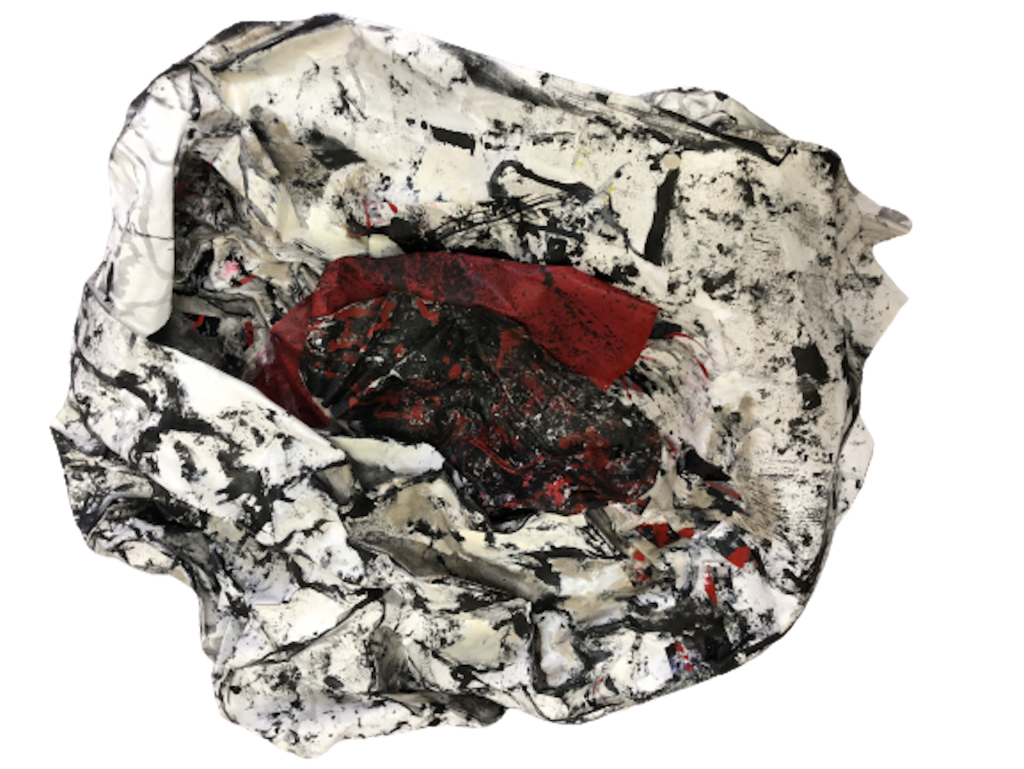
Painting and art were always on her bucket list. Her maternal grandfather was an art collector and her mother, an antique dealer. “We were poor immigrants to New York, but my mother filled the apartment with paintings and antiques she found in thrift shops.”
On her father’s side there are several cousins who are professional artists, with a story handed down about a great uncle who received a scholarship from the Russian Czar to study art in Paris but was killed in a crossfire between police and Bolsheviks before he could go.
Kopf painted in her early 20s but put her love for art aside to pursue a career in journalism. An avid traveler, she travelled twice around the world in one-year backpacking trips, clocking countless hours in museums and galleries.
About 15 years ago she began to paint in earnest, landscapes at first. She studied with several teachers and within several fields including traditional figurative art at the Hatachana School in Tel Aviv. In addition to a BA degree in philosophy and an MA in English literature, Kopf completed a BA in Art History in Tel Aviv University.
It was a meeting with an Israeli art teacher, Ronit Binder, that changed her life when Binder suggested she try abstract art.
“I told her abstract art was not for me, but she insisted that I try. We were alone in her studio and she gave me an exercise to do, to draw on a paper with my eyes closed using only my left hand. Something happened, a tectonic shift,” says Kopf. ”I discovered that abstract art is my calling. It suits my personality, it is free, spontaneous, flowing, and appeals to the child in me that likes to play and experiment,” she says. “I have an active imagination and art is my magical garden.”
For Kopf, what began 15 years ago as a hobby, has turned into a full time calling with several solo exhibitions under her belt, her art pieces in collections around the world and a studio in the Kiryat HaMelacha section of Tel Aviv, a gritty, graffiti-covered industrial section being taken over by artists and galleries.
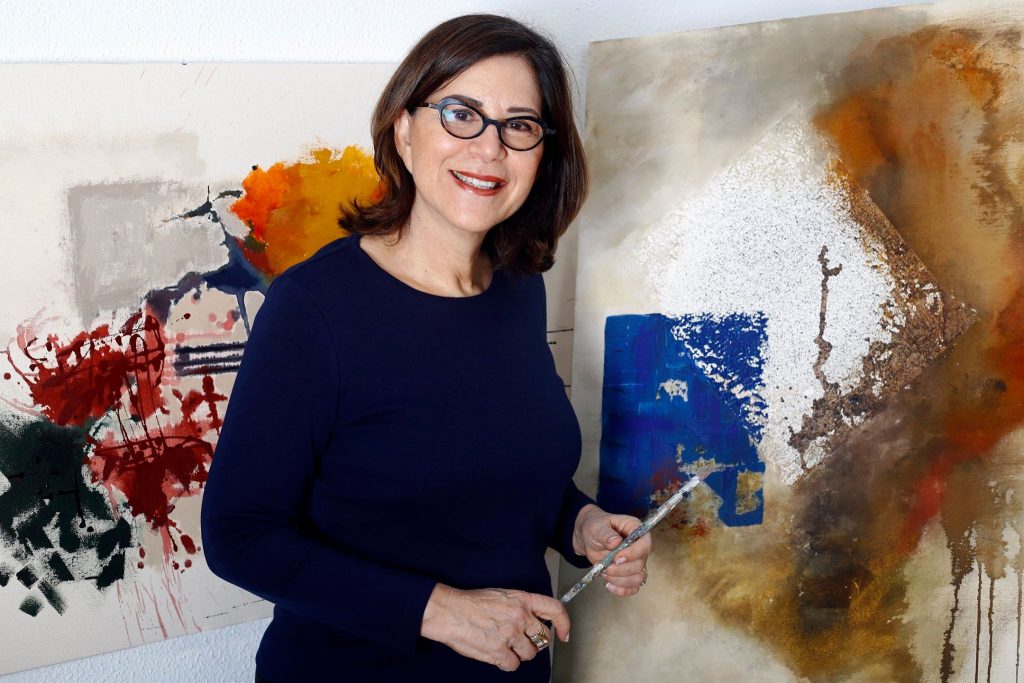
“When I’m in the studio I lose all sense of time. I am not aware that I am hungry or thirsty or if my shoulder hurts, I lose myself in the act of creation. Those are my hours of grace. Very rarely do I plan ahead, I begin and each piece takes its own course.”
In the past two years Kopf exhibited solo exhibitions in Tel Aviv, Krakow and Paris. She has an upcoming exhibition in the prestigious Artist House in Tel Aviv. Normally the waiting period for an artist to exhibit there is anywhere from two to four years.
“The chief curator came to my studio, took one look and gave me an option for an exhibition in a few months. He basically said my works are original, that he had never seen anything quite like them. Needless to say, I was ecstatic,” said Kopf. The exhibition, which was set for October 2020 was postponed to January due to the Covid-19 pandemic.
“I was in a bit of a panic of how to prepare for such a prestigious exhibition in such a short time, but now I have plenty of time.”
However in the meantime, knowing how way leads on to way, her curiosity has taken her in a new direction, beginning new experiments and new techniques she discovered with a new series.
CDMedia is being targeted and obviously too effective! We need your support to put more reporters in the field! Help us here!
- Netanyahu Aims For Full Opening Of Israel By April Following Nationwide Vaccine Campaign
- Report: US Embassy In Jerusalem Construction Plans Approved


